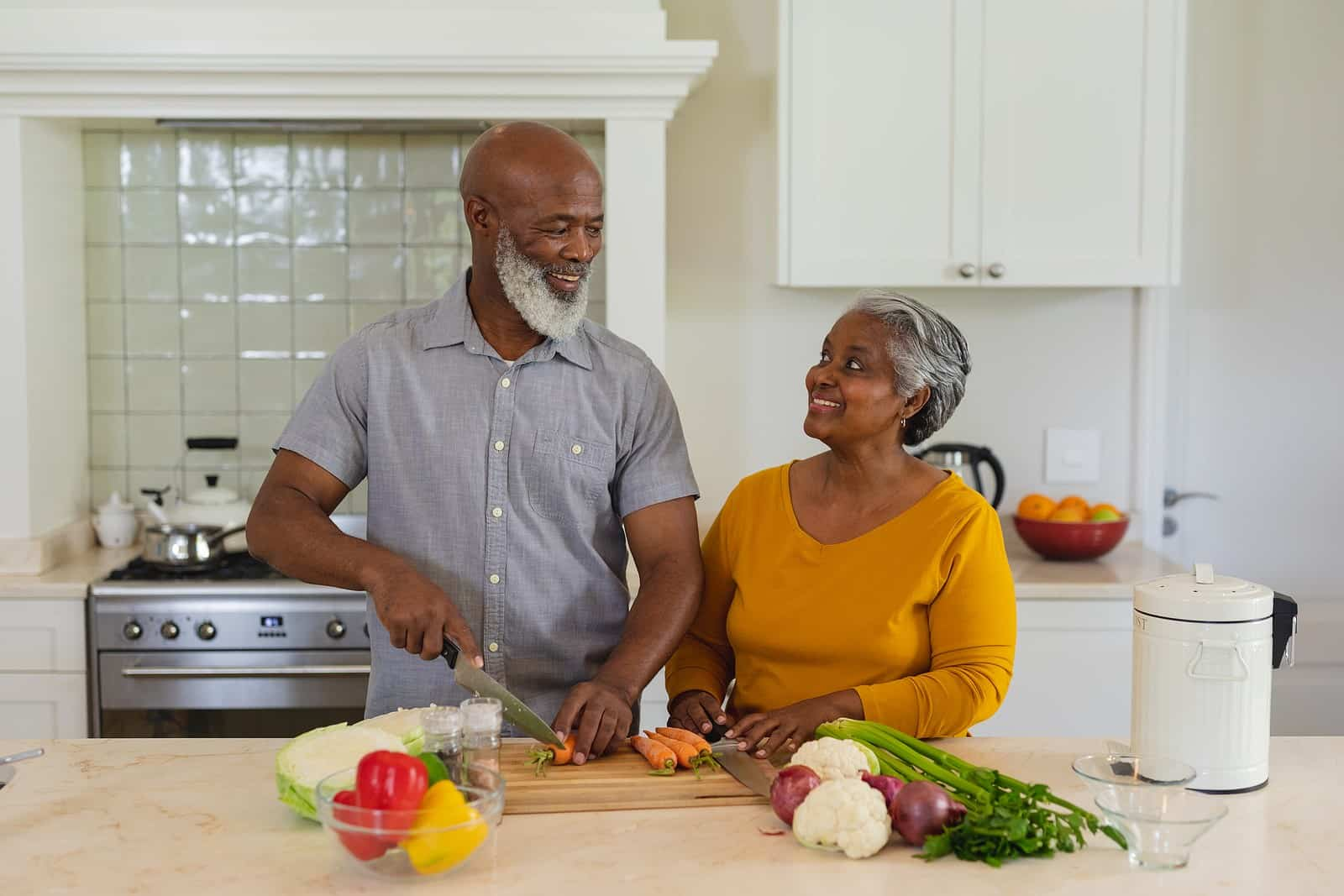One of the most telling signs that seniors need more support to age independently in place is a lack of fresh food ingredients or, even worse, bare pantries and refrigerators shelves. This is why professional home care agencies offer grocery shopping and meal preparation as part of their services lineup, usually under the category of personal services and companionship.
A full refrigerator is not the only concern when it comes to food safety for older adults. Proper food handling and preparation are critical to staying healthy. Since seniors living alone may be less able to adhere to safe food handling and preparation practices, food safety for older adults is an important consideration in any long-term care plan.
Learn how you can help the senior in your life maintain safe food handling and preparation practices. Food safety and healthy nourishment are essential in ensuring older adults continue to thrive independently.
Seniors Are At Higher Risk For Foodborne Illnesses
According to the U.S. Department of Health & Human Services, adults age 65 and older are at a higher risk for hospitalization and death from foodborne illness. Reasons for seniors’ vulnerability to foodborne illnesses include:
- Seniors’ slower digestion allows more time for harmful bacteria to flourish in the gut and cause upset stomachs, diarrhea, nausea, etc. All of those lead to skipping meals or dehydration, which are quicker to cause serious problems for seniors compared with younger adults.
- Diminished liver and kidney function slow down the elimination of harmful bacteria or toxins that would be flushed out before they could cause harm.
- Lower stomach acid levels allow bacteria to survive or multiply instead of killing it off before it can do harm.
- Underlying chronic health conditions, such as diabetes or cancer, make seniors more prone to food poisoning and infection.
- Medication side effects, including dry mouth, and age reduce seniors’ ability to smell and taste, preventing them from noticing when food is “off” or “spoiled.”
- Reduced vision makes it more difficult to read the expiration dates on labels and food products so seniors can’t always tell if something needs to be discarded.
The best way to prevent foodborne illnesses in seniors is to ensure they have access to fresh, delicious, and nutritious foods and that spoiled, stale, or expired foods are removed from the refrigerator and pantry so they aren’t eaten accidentally.
Steps to Preventing Food Poisoning in Seniors
Even if parents or grandparents aren’t ready to consider hiring in-home care support, some steps can be taken to prevent foodborne illnesses in seniors.
Clean Food Preparation Tools
Make sure to wash food preparation tools, especially cutting boards, countertops, and all cooking utensils, with hot, soapy water in between use. This prevents the multiplication of harmful bacteria that make their way into future foods/ingredients prepared on the same surfaces or with the same cooking tools.
Rinse Fruits and Vegetables
Rinse all fruits and vegetables thoroughly and dry them before storing them. You can also purchase special food-grade solutions to remove harmful bacteria, pesticides/herbicides, and waxy coatings from fruit/vegetable surfaces.
Separate Raw Meats and Poultry
Keep raw meats and poultry separate from other fresh cooking ingredients. Keep two separate cutting boards – one for meat and one for fruits and vegetables – for extra protection. We recommend making bold color choices, such as red for meat and green for produce, so seniors can easily decipher the difference.
Proper Thawing of Food
Thaw food in a separate container in the refrigerator instead of the countertop, where slower thawing allows bacteria to flourish. If you forget to take it out on time, defrost it in the microwave immediately before cooking it.
Cook Food to Safe Temperature
Cook raw meats and eggs to their safe temperatures, which includes beef to 145°F; ground beef, veal and lamb to 160°F; pork to 160°F; poultry to 165°F; fish and seafood to 145°F; eggs to 160°F; and leftovers to 165°F. Use an easy-read cooking thermometer to be sure.
Keep Refrigerator and Freezer Cold
Use a thermometer to ensure the refrigerator and freezer are cold enough. The refrigerator should be no more than 39°F, and the freezer thermometer should read 0°F. If the temperatures are higher than that, adjust the temps accordingly.
Refrigerate Food Promptly
When coming home from the store, food should be refrigerated quickly. Keep a separate cool bag and have the grocery clerks bag all frozen and cold items in the designated bag. Bags with cold grocery items should be unloaded immediately when you get home to prevent foods from spoiling faster. This is especially true for all meats, fish, eggs, and fresh vegetables.
Mind Expiration Dates
Follow the “sell by” and “use by” dates to the number. Never use or consume any expired products, even if it’s only by a day or two. Those dates are there for your safety and to preserve the quality of the food products.
Proper Handling of Leftovers
Leftovers need to be handled properly to ensure food safety. This includes:
- Using the leftovers within four days. Write the throw-away date on all leftovers as a reminder.
- Refrigerating restaurant leftovers or take-out within two hours. If the car or outdoor temperatures are above 90°F, leftovers must be refrigerated within one hour.
Avoid Eating “High-Contaminant Foods”
As an extra precaution, there are some foods that seniors should avoid altogether. The FDA and Academy of Nutrition and Dietetics recommend that seniors stay away from foods that are more prone to causing foodborne illnesses, such as:
- Raw or undercooked meat
- Premade deli salads that combine meat, eggs, cheese, and/or veggies (these are better made at home where you can control food freshness and expiration dates)
- Refrigerated smoked meats unless you combine them in a cooked food
- Raw or undercooked eggs (switch to over-medium or a medium poach instead of soft poached or over-easy)
- Unpasteurized dairy products such as milk, yogurts, cheeses, etc.
- Unpasteurized fruit and vegetable juices
- Raw sprouts
Let North River Home Care Help With Food Safety for Older Adults
If your senior loved ones can’t adhere to these food safety guidelines, consider working with a local caregiving agency. In addition to meal prep, our North River Home Care professionals can do the grocery shopping, unload/put away grocery items, and make sure the fridge and pantry are free of expired food items.
Honoring senior food safety concerns helps us keep our clients’ brains and bodies as healthy and nourished as possible.




